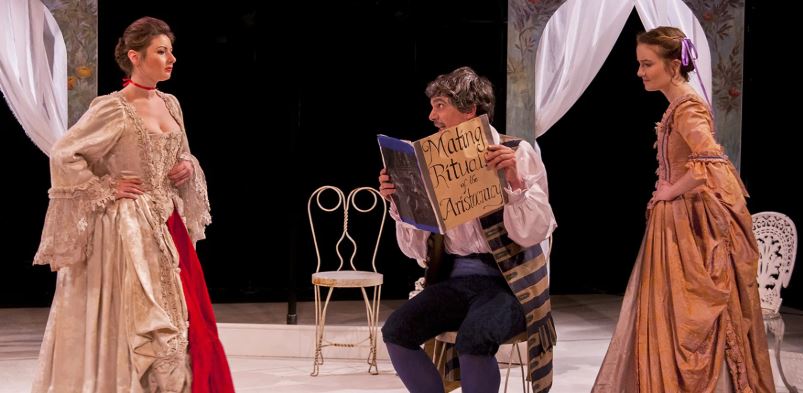The British pro-am opera sector, one of the many eccentric local phenomena which differentiate our society from others, still awaits its historian and its sociological analysis. I shudder to think, in these days of wokeness, how damning the latter might be; but the roots of the sector are in the civic choral tradition which began in the early 19th century (the Huddersfield Choral Society, still going strong, was founded in 1836). By the end of the century, there were choral and opera societies in towns and villages all over Britain. Each trotted out one or two productions a year of opera from Mozart to Gilbert and Sullivan sung to a piano accompaniment, with costumes stitched by members and financed at least partly by the singers who were happy to pay for the opportunity to display their talent (or at least their self-confidence) to an audience.
Over the last 50 years, the old-style amateur societies have been fading away due to lack of finance and venues, and the attractions of other pastimes. Some which survive, though retaining the word “Opera” in their title, are reduced to offering less ambitious activities. But their legacy has been vital to the British performing arts — they provided the first work experience for many of the great British professional singers and actors. From them developed the new wave of opera societies, dedicated to supporting young singers on the verge of a career, and with them tomorrow’s production and music directors, in professional stagings.
Now I find myself involved in this exciting movement. It took me almost 70 years to discover what I would be when I grew up, but it turned out last year that I was to become an opera impresario. The award-winning charity HGO (formerly Hampstead Garden Opera), of which I became chair, was founded 30 years ago. Thanks to the incredible efforts of my predecessors and their colleagues, it is now North London’s leading opera company, enabling local communities to experience two fully-staged productions with orchestra a year of operas ranging from Monteverdi to the present day. The skills of our young singers and production teams are wonderful and continually inspiring.
My knowledge of the industry had been limited to my studies of the grand opéra of 1830s Paris. But nothing much has changed since then, the key issues remaining publicity, assuaging the artistic temperament and, most important of all, money — from bums on seats and elsewhere. Companies not fortunate enough to have substantial corporate or public sector support depend on the generosity of their Friends’ circles and individual patrons, and on the box office, with the hope of an occasional grant from trusts or the Arts Council.
Ticket sales pull towards one direction — essentially Italian-libretto operas of the “long 19th century” — which can inhibit artistic exploration. Grant applications, very reasonably in my opinion, are often predicated on community and/or education involvement, which not all organisations have the competence to develop effectively (beyond lip-service). This itself comes at considerable cost which could be devoted to productions. HGO (and many others) still can’t afford to pay its singers, although at least we’ve stopped asking them for contributions. But we are still (without grants) developing our work with local schools. It’s not enough to advance young singers: we recognise the need to advance new audiences as well. The interest and involvement of the children at our staging workshops is a reward in itself.
But the consequence of public sector opera support going on one hand to cover the massive overheads and costs of the big opera institutions, and on the other to independent organisations based on the criterion of social commitment, is that the unfashionable issue of artistic standards is put at risk. We are still judged, I fear, by the prejudice that opera is “elitist” (let alone, in our case, that we were originally associated with an area as hideously haut-bourgeois as Hampstead Garden Suburb). However, it is HGO’s artistic reputation which results in the huge response we get to calls for auditions and directors for our productions, giving us a chance to spot the best. And if singers and musicians cannot be inspired to aim for the top levels of skill, if young producers and music directors can’t get the opportunity to work with them, and if audiences cannot access the thrill which great opera can provide, then we can’t truly provide for the future of the art.
Look for a dispiriting example at London Mayor Sadiq Khan’s culture strategy for London, released last December. The 180-page document, misleadingly titled Culture for All Londoners, mentions the word “pub” 25 times, “club” 16 and “bar” nine. The word “opera” appears nowhere. A statement on culture by the Deputy Mayor speaks for itself: “Culture has defined our city through the decades, from reactionary punks in the 70s to grime music today.”
And yet throughout London, aside from the two big opera houses, there is a host of high-level independent opera activity which attracts audiences, both local and tourist, enables the flourishing of new talent, and makes a major contribution to the capital’s cultural reputation and economy. Look at what is achieved by Fulham Opera, the Grimeborn Festival at the Arcola Theatre, OperaUpClose, Pegasus Opera and Opera Holland Park, to name but a few — and by HGO itself, may I modestly add.
https://standpointmag.co.uk/issues/may-2019/the-threepenny-opera-boom/

 RSS Feed
RSS Feed
